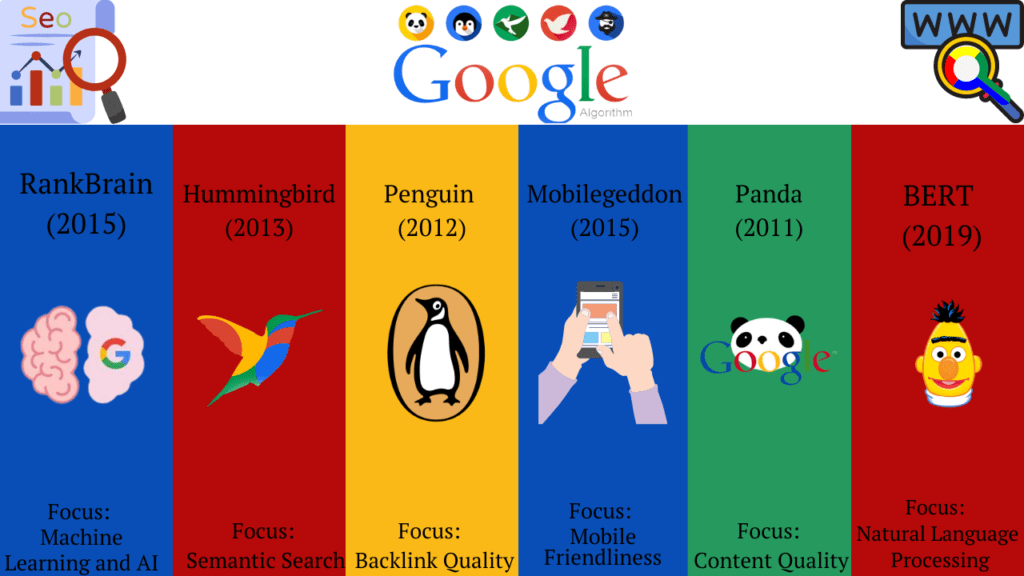Table of Contents
ToggleWhat Are Google Algorithms? A Deep Dive into the Heart of Search Engines
Understanding Google algorithms is essential for boosting your business’s online presence. But what exactly are these algorithms, and how do they impact your website’s ranking on Google? In this article, we’ll break down Google’s search algorithms and explain how they relate to search engine optimization (SEO).
What Are Google Algorithms?
Google algorithms are complex systems designed to retrieve data from its search index and instantly provide the best possible results for a user’s query. These algorithms use hundreds of factors, such as content quality, keyword relevance, and user experience, to rank websites on search engine results pages (SERPs).
Each update to Google’s algorithms aims to improve the relevance of search results. Poor-quality or irrelevant websites are penalized, while websites that provide valuable and well-optimized content are rewarded with higher rankings.
Major Google Algorithm Updates: A Timeline
Google algorithm have come a long way through various updates. There are a few significant evolutions that dictate how we think about SEO throughout the years.

1.Panda (2011)
Focus: Content Quality
Impact: Penalized websites with low-quality, thin, or duplicate content. Emphasized the importance of original, valuable content that enhances user experience.
2. Penguin (2012)
Focus: Backlink Quality. promoted the use of natural, high-quality backlinks and moral link-building techniques
Impact: Targeted sites employing deceptive link-building strategies, such as spammy or pointless backlinks.
3. Hummingbird (2013);
Focus Semantic Search.
Impact: Enhanced Google’s comprehension of search requests by emphasizing word intent rather than merely keyword matching. increased precision of search results, particularly for questions that are conversational.
4. Mobilegeddon
Focus : Focused on mobile friendliness. penalized mobile-inefficient websites, highlighting the necessity for responsive design and quick mobile loading times.
Impact: Prioritized mobile-friendly websites in search results;
5. The RankBrain Study (2015)
Focus: Machine Learning and AI. constantly learns and adjusts to enhance the relevance of search results depending on user interactions and behavior.
Impact: AI was used to better comprehend and interpret complex search queries.
6. The 2019 BERT
Focus: Natural Language Processing. enhanced the precision of search results by improved interpretation of user intent.
Impact: Improved Google’s comprehension of word subtleties and context in search queries, especially in long-tail and conversational searches.
How Does SEO Affect Google Algorithms?
Comprehending these algorithms is essential for effective SEO. The following are some ways Google algorithms impact the functionality of your website:

1. Quality of Content
The necessity for excellent, pertinent information that successfully responds to consumers’ searches is emphasized by algorithms such as Panda and BERT. Well-researched, unique, and reader-beneficial content typically ranks higher. Maintaining high ranks also depends on upgrading your material frequently to keep it current and useful.
2. Usage of Keywords
Whilst using keywords correctly is important, using them excessively can result in penalties. User-friendly, organic content is preferred above keyword-stuffed pages by algorithms like Penguin and Hummingbird. In order to have the information read smoothly and fulfill the user’s purpose, the emphasis should be on carefully choosing keywords inside the content.
3. Backlinks
Reputable sites’ backlinks increase the legitimacy of your website. However, as the Penguin update has shown, backlinks that are spammy or irrelevant may be penalized. Developing a varied backlink profile naturally through collaborations, guest posting, and the production of content that is easily shared is essential to keeping up a robust SEO campaign.
4. Experience of the User
Websites with an excellent user experience are given priority by Google. Easy navigation, mobile friendliness, and page load speed are all important ranking factors. Your website’s SEO performance can be greatly enhanced by making sure it is simple to use, has a clear structure, and loads quickly.
5. Mobile Optimization
Mobile searches have now exceeded desktop version, the Mobilegeddon update signifies to the importance of having a responsive design that is uniform across all devices. The first design and content strategy for mobile devices is the essential ingredient to be ahead of competition in the world of the internet today.
How to Keep Up with Google Algorithms
1. Concentrate on High-Quality Content: Developing unique, interesting, and educational content that satisfies the demands of your audience should always come first. Content ought to be valuable, easily readable, and well-organized.
2. Stay Up to Date: Google upgrades its algorithms often. Keeping yourself informed will enable you to modify your SEO tactics as necessary. You may keep up to date by attending webinars, engaging in SEO forums, and reading industry blogs.
3. Mobile Optimization: Make sure your website is responsive to prevent a loss of visitors and search engine rankings. Make the required changes to your website’s mobile responsiveness by using tools such as Google’s Mobile-Friendly Test.
4. Use Natural Language: Compose information in a style that mirrors how readers communicate and browse. This strategy is especially crucial for voice search optimization because an increasing number of people are using voice-activated gadgets like Siri and Google Assistant.
5. Develop Credible Backlinks: Pay attention to obtaining backlinks from websites that are relevant and well-known. Effective tactics include influencer collaborations, guest blogging, and producing high-quality material that people want to link to.

Conclusion
The fundamental component of SEO, Google algorithms greatly influence how visible your website is. You may google ads optimization your website to rank higher on SERPs and increase organic traffic to your business by being aware of these algorithms and making necessary adjustments to them. Remain informed about algorithmic modifications and concentrate on providing high-quality content and an exceptional user experience to thrive in the dynamic digital environment.

